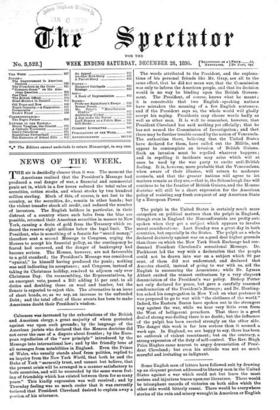The pulpit in the United States is certainly much more
outspoken on political matters than the pulpit in England, though even in England the Nonconformists are pretty out- spoken when they get a subject which appears to involve moral considerations. Last Sunday was a great day in both countries, but especially in the States. The pulpit as a whole declared decisively against war on a good deal higher grounds than those on which the New York Stock Exchange had con- demned President Cleveland's sensational Message. Dr. Parkhurst led the way with a declaration that the people could not be drawn into war on a subject which 90 per cent, of them did not understand, and declared that America should, instead of going to war with us, aid the English in succouring the Armenians ; while Dr. Lyman Abbott excited the utmost enthusiasm by a very eloquent denunciation of the President's war policy. Bishop Potter not only declared for peace, but gave a carefully reasoned condemnation of the President's Message ; and Dr. Hunting- ton asked his congregation in New York on what pretence it was proposed to go to war with "the civilisers of the world." Indeed, the Eastern States have spoken out in the strongest way against the war, while we hear very little even from the West of belligerent preachers. That there is a good deal of strong war-feeling there is no doubt; but the influence of the pulpit has been exerted strongly on the other side. The danger this week is far less serious than it seemed a week ago. In England, we are happy to say, there has been no outbreak of violent resentment; but on the contrary, a strong expression of the duty of self-control. The Rev. Hugh Price Hughes came nearest to angry denunciation of Presi- dent Cleveland ; but even his attitude was not so much scornful and irritating as indignant.


































